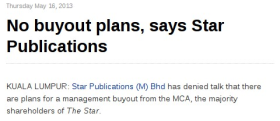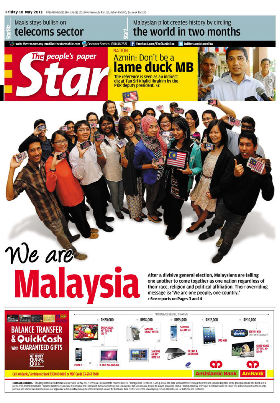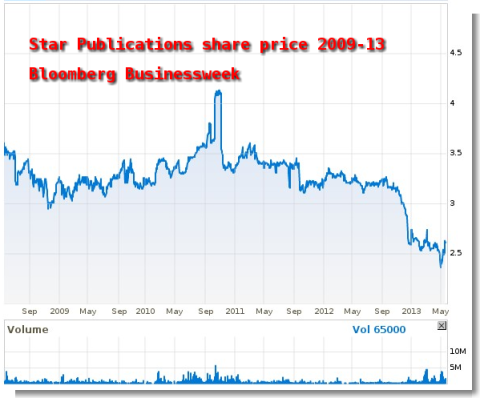Twice in the recent past MCA leader Chua Soi Lek had spoken against political ownership of Malaysian media.
uppercaise
Questions of credibility and crumbling sales
Although MCA president Chua Soi Lek has firmly denied speculation of the party selling off its assets, among which The Star is a prize item, for its political and financial power, it is still an open question as to whether the MCA’s ownership of the paper is becoming a drag on the paper and its commercial success. [No sale]
Raja Petra Kamarudin at Malaysia Today had speculated yesterday that the MCA would suffer the fate of Umno after its deregistration and rebirth as Umno Baru in 1989, and become subject to asset-stripping by its taikos.
RPK had named the Star’s chairman, Fong Chan Onn, executive deputy chairman Vincent Lee as among those most likely to lead any such shuffling of MCA assets. [RPK]
Speculation about a possible sale of MCA holdings in property and investments (the MCA building in Jalan Ampang, Menara Multi-Purpose in Capital Square and others) arose after the party's drubbing at the general election on May 5. Only seven of its candidates were returned as MPs, and 11 as state assemblymen in its worst electoral performance.
Soon there was further talk of giving up the ghost and liquidating the party's assets.
The Star is a prize asset, together with its minor publications and three radio stations. The party’s 42% stake in Star Publications, the publishing company, bring in tens of millions of ringgit in annual dividends.
There is also the prospect of making capital gains — but any fire-sale of the investment in the Star would result in a massive loss. The MCA paid RM1.2bln to take over the Star stake from Huaran Holdings, the party’s investment arm. At its current trading price of RM2.60, the party’s 313mil shares have a market value of just over RM813mil — RM400mil less than it paid for the stake.
The rumours begin

A dud: MCA attack strategy

Vincent’s agencies blamed

More fearmongering

More criticism

More hypocrisy

That decline in value is also reflected in the Star’s loss of credibility among the politically aware, robbing the the MCA of any advantage it might have had from the Star’s reach into the hearts and minds of the Malaysian Chinese electorate, and Malaysian society as a whole,
The market has shifted. The Star’s core readership of middle-class Malaysians in urban centres turned its back on the Barisan Nasional and the MCA at the general election, and there is increasing criticism of the paper’s sycophantic coverage of the MCA.
There is generally lacklustre coverage of opposition politics (but even that is criticised by pro-Umno bloggers and brings rebukes from Barisan Nasional flunkies at the PM’s Department).
The Star is thus caught at a crossroads, damned if they do and damned if they don’t. Coverage of opposition politics, especially of the DAP, brings swift complaints from MCA and Umno politicians. Critical coverage of opposition politicians brings swift condemnation from readers and calls for a boycott.
In the Star newsroom, as well as newsrooms elsewhere, are a large number of journalists who would be personally predisposed towards the opposition, for much the same reasons the urban middle-class rejected the Barisan Nasional at the elections: out of sympathy for the underdog, out of disgust with the oppressive and over-the-top racialism of Barisan Nasional politics, as well as professional disgust at having to give a professional gloss at propaganda.
(However any disgust at giving a professional gloss to the commercial propaganda that fills most of the other pages is mitigated by an innate sense of survival.)
It was that, as well as a foreboding of rejection by readers, that led to appeals by senior editorial executives of a more even-handed approach — and if there was any, there was little sign of it after the elections, with even more apple-polishing and a rah-rah jingoism.
The question now is whether the paper may ever regain credibility, if not sales, through changing the form of the party’s ownership and control, and more openness in editorial coverage.
Twice in the recent past MCA leader Chua Soi Lek had spoken against political ownership of Malaysian media. Opposition politicians have been reluctant to take a public stand, except for DAP leader Lim Guan Eng’s little-noticed statement last year expressing support for ending political ownership.
Faced with fading credibility, declining circulation sales, and flagging share prices (it picked up 20sen over the weekend after dropping steadily), a well-managed buyout could be one way out. It would also make the fortunes of those in the buyout team, if the company was refloated again in years to come or sold off or “flipped” to another buyer. Umno’s corporate predators are always waiting in the wings for such an opportunity to get at the Star.
However, the changing ownership of the New Straits Times Press, through proxies for every Umno president, has shown that nothing really changes in the newsroom except for the furniture (executives included). Selling off the MCA’s holding would only give a public appearance of severing a party connection, besides allowing a select few cronies to make a bundle.
The crux of the matter is whether the MCA is desperate enough to allow the paper the editorial independence it needs, and thereby regain some of its own credibility through honest reportage.
That is a tough ask.
Honesty and politicians (including politician-journalists) are an unlikely pairing.




No comments:
Post a Comment
Note: Only a member of this blog may post a comment.